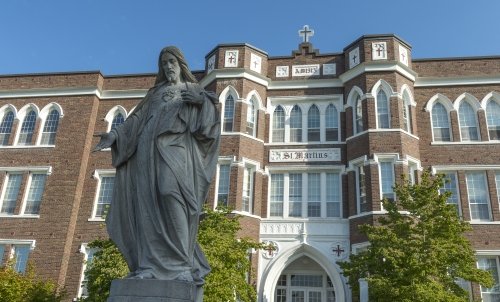The following is a letter Provost Kate Boyle, Ph.D. sent to the Saint Martin's community regarding the crises we are facing as a nation and our work as a Catholic, Benedictine community to disrupt and dismantle racism.
Dear Saint Martin’s students, faculty, staff and abbey members,
In The New York Times’ article “Two crises convulse a nation: A Pandemic and Police Violence,” authors Jack Healy and Diane Searcey talk about America’s “parallel plagues.” One is a health crisis that leads to potential death and minimally takes its toll on our bodies, hearts, and minds in ways that demand isolation in order to address. The other is a crisis with a longer, insidious history that continues to take its toll on our bodies, hearts, and minds in ways that demand an outward community response.
Words to address the second of these crises are utterly inadequate right now. Headlines from this past weekend refer to the unchecked White privilege of Amy Cooper and include the inconsolable pain, grief and rage felt across the country in response to the recent murders of George Floyd, Breonna Taylor and Ahmaud Arbery.
As someone who most recently lived and worked in Minneapolis, at the University of St Thomas, less than a mile from where George Floyd died, I have had numerous former students, colleagues and friends reach out in despair over what is occurring in this divided country.
I am under no illusion that these past few weeks are an aberration from what happens every day to Black people and people of color more generally, but the senselessness of the deaths and combined with fatigue/stress/worry over COVID-19 have left me overwhelmed and struggling to find my center. And I note, even as I write this, that this is from my place as a White woman with much privilege. These recent events are merely the latest in a long succession of violent atrocities committed against Black people in this country.
For our students, staff, faculty, and community partners of color, I am so sorry for the suffering, anguish, and pain you are experiencing right now. As a community and as allies, we must stand with you and bear witness to the fury unleashed over centuries of violence against the Black community particularly and all communities of color. Racial oppression is real, sinister, and deeply ingrained into the fabric of our society. We all bear responsibility for it and each and every one of us must take a stand to say NO MORE.
As Colleen Dunne, our director of campus ministry, noted in her letter this weekend, “As a Catholic, Benedictine university, we at Saint Martin's must work together and remain vigilant towards our values. ... we must remain unified and steadfast in our work to end injustice and stand with so many affected by these events – both here on our campus and in our greater community.”
Saint Martin’s University collectively must look to disrupt and dismantle deep structural racism as being at the heart of our work. Structural racism does not allow for us to open up space for all and we cannot move forward until that occurs.
There are many proactive actions that we as a community can take:
- We must acknowledge the problematic histories and practices of educational institutions in perpetuating racialized trauma and harm and ignoring these issues in self-serving ways.
- We must firmly commit to a vision and promise of education that supports the thriving of communities, families, and individuals impacted by the ongoing legacies of racism.
- We must bring our collective resources and expert research to bear in fostering the cultivation of critical consciousness and developing approaches that disrupt oppression and proactively generate more just futures.
This past weekend, Portland Mayor Ted Wheeler led an inter-faith conversation at SEI that featured a number of prominent local African American leaders. The event can be seen on YouTube. I was particularly struck by Kali Thorne Ladd’s words (starting at the 18-minute mark) about the plight of Black children in America who may be suffering and grieving “every time we see a life lost like George Floyd.” She expressed the pain of what it means to be black in America today. She urged educators not to be silent in the face of injustice. The most powerful moment of Thorne Ladd's speech came when she said, while holding back tears, “I believe that when a White child can see the humanity of my Black son, it becomes much harder to crush him with their knees.”
As President Heynderickx stated in his letter last night, we, as Saint Martin’s faculty, staff and students, are all called to live up to our moral responsibility. We must stand in solidarity with all those who oppose prejudice and who oppose hate. We must use our campus community and spaces to hear from, listen to, and understand the anxiety and fears of what our fellow Saints, particularly those who are black, brown, and indigenous people, are experiencing. Saint Martin's will not tolerate, condone, or permit hate speech, racism, or white supremacy.
As members of our Saint Martin’s, I invite you to consider these questions: How can we avoid allowing debates to flourish that blame these students and their communities for the challenges we face? Are there specific ways in which we can challenge our White community members to have empathetic regard for our fellow students, faculty and staff of color? How can we create spaces for healing within and outside our classrooms that bring diverse students together?
This is challenging work, but this is the time we all must act – individually and together. I hope this situation will awaken in us the desire to make certain that issues of equity, diversity, and inclusion are priorities in all the work we do, as classmates, colleagues, mentors and leaders.
Sincerely,
Kate Boyle, Ph.D.
Provost
Saint Martin's University
Published

